In our continuing coverage for the Disney+ series, The Right Stuff, we had a chance to chat with Michael Trotter, who is embodying astronaut Gus Grissom in the new series.
Michael's most recognized television role was in the WGN America series, Underground, so he's got a tie to historical productions.
Get to know him a little better in our interview, and be sure to watch The Right Stuff on Disney+ on Fridays!
So tell me, how did you first get involved with The Right Stuff?
Well, it came to me through the pretty traditional system of just getting an appointment for it. Funny enough, though, I actually wasn't in town. There's an old adage when it comes to acting, when things are slow, book a trip out of town and you'll probably get an audition.
I mean, I wasn't going by that, per se, but I had had a trip planned for a long time with my fiance to go to Greece for a friend's wedding, and then we were going to go kick around. Sure enough, I think I was on the island of Crete when I got the appointment, and was like, "Of course. Of course this is when this happens."
Got a day planned to go kick around this island, and now I have to try to scramble to put an audition together half a world away. So that was my first introduction to it. I did that, and then when I came back, they were still casting, so then I was able to actually go into the room and meet everybody and kind of do the audition again. First audition was on the island of Crete.
Oh, that's a pretty good memory, though.
It is. It's hilarious. There's side story to it, too, where I really didn't have much time, and I had to get a couple people that were in our group to help me film, and all that kind of stuff. My fiancé is an actress, so she read with me, but I didn't have the general amount of time to kind of go through the videos and really pick which take I liked the most, and more specifically, I didn't even get to listen to it.
The funny part about it was, I put it together really quickly and sent it, and my manager was like, "It's a good take, but what is going on with all of those birds?" I was like, "What do you mean?"
Again, I hadn't really watched it or listened to it, but I did it outside of the Airbnb that we were staying at, and just didn't notice that there was a massive cacophony of birds in the background.
The take, while you can hear me talk, it's kind of distracting because there's just these birds. There's these birds trying to get a word in. I think it was they were just recognizing, "Hey, this is an audition about flight, it makes sense. We'll have our take too."
Microphones don't just pick up your voice, they pick up these ambient sounds that you can't hear, or you're not paying attention to at all when you're filming something, and then there it is. It's just huge.
Yeah, yeah. I wish I still had the take, because it would be a hilarious addition to any kind of of EPK or outtake thing. It's like, "Michael Trotter's initial audition with 1000 birds."
What was your familiarity with NASA and The Right Stuff before you joined the show?
I read the book when I was in high school.
Oh good.
Yeah. I'd seen the movie, too, so I was familiar with this story. Certainly growing up as a kid in the '80s, when I was real young and when the space shuttle program, that was an everyday thing, I remember being really young and watching the Challenger, actually.
Right.
Yeah, it's crazy. I wasn't one of those kids that was trying to get my parents to sign me up for Space Camp. I think I had just a general fascination with it, but I loved the book when I read it. I remember it kind of opening up that door of, this is less about space and kind of more about the people that were on the ground trying to kind of make this crazy idea a reality.
That was kind of my introduction to it. It was a long time ago, and I obviously remember the names John Glenn and Alan Shepard, but as far as Gus was concerned, I remembered who he was, but kind of came into the project not knowing many specifics about him or his life.
What kind of preparation did you do to kind of get into that character, who is, of course, a real person?
Yeah. Yeah. The crushing weight of legacy. You know, I love the portion of the job that is research based. If I'm given an infinite amount of time, I can spend it diving down deep into the research rabbit hole, so I did. I tried to uncover as much as I could about him, whatever books were out there. I read a lot of the other astronauts' books, especially the portions that kind of referenced him and their relationship.
I have a massive file of pictures. Photography was really helpful for me in this job in particular because there isn't ... Gus tragically passed away in the late '60s in Apollo 1, and he had never written his own book. Now, there's a great book about him that I dog eared and flipped through quite a bit.
There isn't as much on him as there is other people, at least first hand source material, so photography was great, because there's a lot of pictures of him. They can tell a story too, in terms of just being able to uncover, bit by bit, the truth of his life. It was kind of all over the place and had a good month to do it, and it was, like I said, it's a lot of fun , and daunting. It's exciting and daunting.
Right.
Because you feel the weight of that responsibility. This was a living, breathing person who moved in and out of this world, and not just any old body. It's someone with a remarkable life and peppered with remarkable achievements, so a lot to kind of incentivize you to try to get it right as best you can.
You know, Gus was, unfortunately, the astronaut who kind of came in second most of the time. What's it like playing a character who ... Like you said, you didn't remember Gus Grissom's name from The Right Stuff.
Yeah.
You remember Alan Shepard and John Glenn, who even wasn't second. It's so interesting how people could be so close and yet so far from the pinnacle of history. I'm wondering, how does that come into play with him as a character and as a human?
You know, it's a great question. I think you look at the reality of it, and you try to walk back the steps to what led to that moment of being picked. I came to learn that Gus couldn't cared less. They were fiercely competitive, don't get me wrong. I think he absolutely wanted to be the first person in space, as I think all of them did.
They wouldn't have been picked if they didn't have that level of drive. I mean, there's that famous picture of them that we recreated where they're asked in the press conference, "Who going to be first?" and they all raise their hand. I don't think that was inauthentic at all. Even though it made for a wonderful photo op, I also believe that it was 100% truthful on all of their parts.
But I think for Gus it was more about the task at hand. He was a very intentional guy. He lived his life that way. He was efficient with his time and his words. I think, in a lot of ways, he's been misrepresented because of that.
It's just sort of coming off as gruff or press shy or ... Don't get me wrong, that component of the responsibility for him, I think it took Gus, in particular, a little bit longer than maybe some of the others to sort of get used to the fact that the media blitz that descended upon them once they were picked was something that I don't think he was prepared for as some of the others.
It took him a little while to learn the importance of that and how it played with the financing of the program and the image needing to be uphold so that Congress continued to fund it.
Back to your question, for me, it was interesting. It's a fair question. It's interesting to kind of uncover his thoughts about that. He wanted to be first, but he just wanted to go to space. Frankly, going up second, I don't think he could've cared less about what the legacy of it was, just to be a part of a program and to further it, and to kind of meet the moment at hand and be a part of something that was, frankly, in my mind, as extraordinary as it was insane.
What they were trying to accomplish was still kind of blows me away, because it isn't like you're sitting down to read Going to Space for Dummies.
Right. They were dummies. They were the crash test dummies, right there.
Absolutely. I mean, certainly in a pejorative way for the Chuck Yeagers of the world who were calling them Spam in a can. It was sort of like taking away the piloting aspect of it and minimizing it to just being something that was on top of a missile.
I was fascinated to learn how nascent the technology and their understanding of what was needed. They had to learn it as they went, and they had to do it incredibly quickly. We're not talking about something simple here.
Right.
We also are talking about people's lives, and not only that, but in the face continually testing these rockets and having them blow up. It takes something from the abstract and makes it pretty concrete pretty quickly. You know, that these are living, breathing people who you are actually trying to put on a top of a nuclear missile and shoot them into space. You know, how do you figure that out?
For men who were so used to being in control of their own fate, too, they were put into a really difficult position not having that control, being in that capsule.
Yeah. Yeah.
I don't see them as that kind of men, allowing others to determine where they're going. They were very driven, so having somebody else, basically, drive, was so much pressure, not just the nuclear thing.
Not just the nuke under their butts, but literally to achieve so much, had to have really messed with their minds, I would think.
I think so too. There's a lot of historical records on their complaints at the time. We reference it in the show: where are the controls? These guys went into the program as pilots, expecting to be in control and expecting to fly the thing, and that, at least from the initial conception, wasn't in line with what NASA and the engineers were thinking.
They very much protested. By the time it came time for Glenn to go up in orbit, there was a little bit more of a manual control component. It's funny that you bring that fact up because Gus's responsibility, once they moved out of Mercury and into to Gemini program, because he came from an engineering and a masters in aeronautics ... Another thing that is completely misunderstood about him is he was whip smart.
He designed a lot of the controls within the Gemini program so that it looked more like what a pilot would see when they got into their plane.
Oh, interesting.
Yeah. They called it the Gusmobile in the Gemini program. It's funny, because a lot of people, back to what we were talking about earlier, Gus sort of being the forgotten astronaut, it's actually remarkable. He's the second man in space, but he's the first person to ever go to space twice.
Right.
He's the first American to ever go into space with someone else. So Gemini was the first time that we ever sent two people up. You know, it's just interesting that his achievements ... Again, I'll reiterate, I don't think he would've cared less about whether he got notoriety for it.
It was just the fact that he did it and came back safely and advanced the program that I think he cared about. But he has a lot of kind of firsts there that people don't talk about a lot. If you can't tell, I've become a fierce Gus apologist.
Absolutely. Why wouldn't you? Just one last question because it looks like I'm very over my time. I do want to ask real quick, are you hoping for more seasons? Because, especially, we know what happens to him in Apollo. It seems like you could get some very interesting material to play and some really dramatic stuff.
Well, absolutely. Not just Apollo. If we're fortunate enough to get a second season, it would presumably start with Gus's flight, and there was quite a bit of drama that surrounded that, as well.
I don't know if you remember this or not, but he came back. It was kind of a perfect flight and reentry and landing, and then the second flight was the first time that they had implemented this new explosive hatch, and while he was in the Atlantic waiting to be picked up, it inexplicably blew, and his capsule sunk, so he crawled out into the Atlantic and had to be rescued.
It was very much a big deal, and very much a turning point for him within the program, and brought on a lot of, again, the media latched onto it and made a story about it. So to answer your question, oh yes, for a lot of reasons I think all of us actors would love more seasons.
I hope there are.
Yeah, me too. I mean, look, there's a lot of stories to tell within this. This first season is very much focused on at least the driving engine between Shepard and Glenn. It's something that's a little bit more familiar, but there's a ton of stories behind that.
I think the first season has done a good job, especially with the focus on the lives and the impact that this had on the entire family. It's something that I think is unique in this season. But moving to season two, three, four, how many ever we're lucky to do, there's such a treasure trove of interesting things that I think will make for incredibly compelling TV, if we're fortunate enough to keep it going.
Be sure to watch The Right Stuff Fridays on Disney+!!
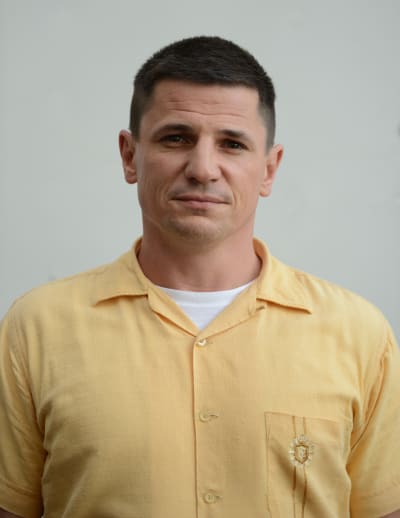
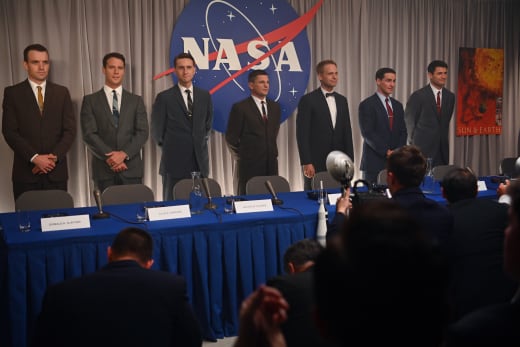
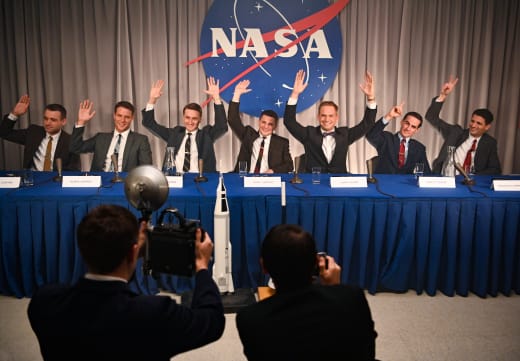

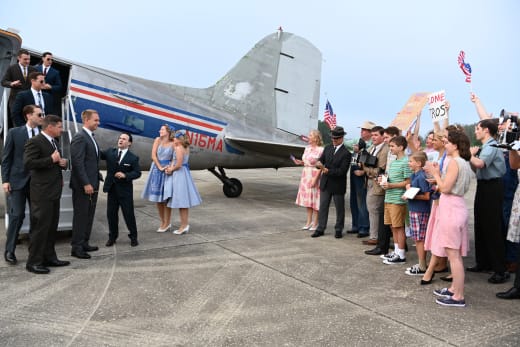
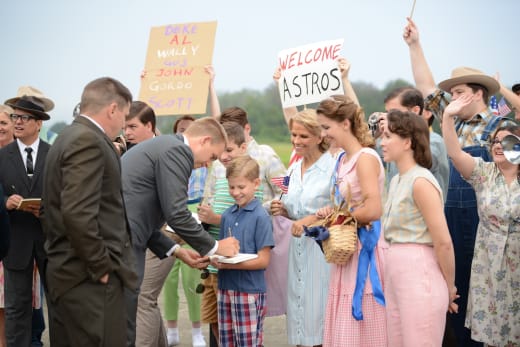
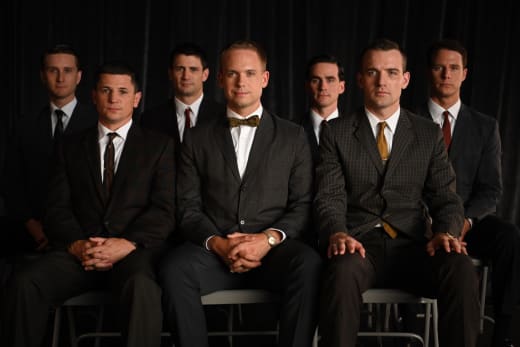
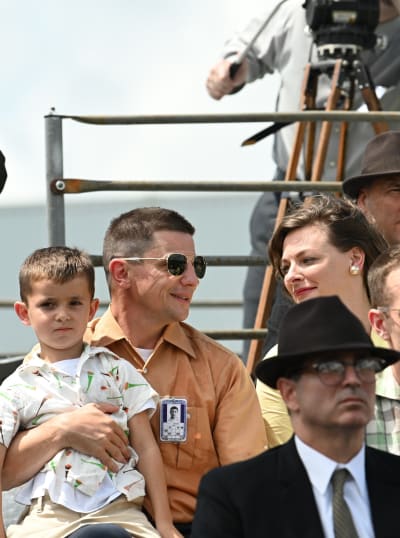
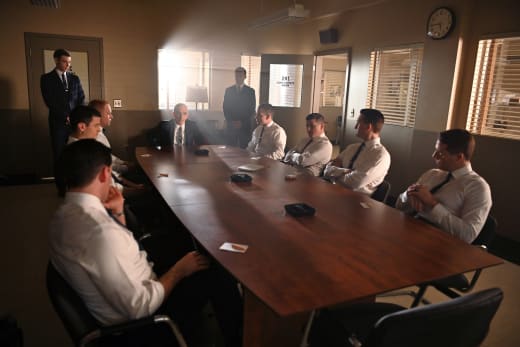
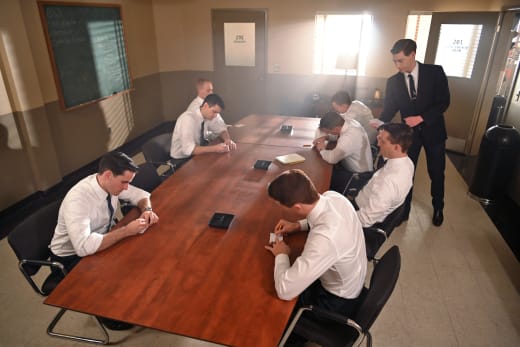
Post a Comment